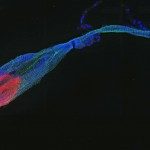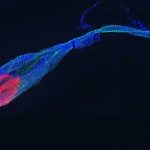Lien vers Pubmed [PMID] – 10651866
Eur. J. Neurosci. 2000 Jan;12(1):117-25
CXCR4 is the Gi protein-linked seven-transmembrane receptor for the alpha chemokine stromal cell-derived factor 1 (SDF-1), a chemoattractant for lymphocytes. This receptor is highly conserved between human and rodent. CXCR4 is also a coreceptor for entry of human immunodeficiency virus (HIV) in T cells and is expressed in the CNS. To investigate how these CXCR4 ligands influence CNS development and/or function, we have examined the expression and signalling of this chemokine receptor in rat neurons and astrocytes in vitro. CXCR4 transcripts and protein are synthesized by both cell types and in E15 brain neuronal progenitors. In these progenitors, SDF-1, but not gp120 (the HIV glycoprotein), induced activation of extracellular signal regulated kinases (ERKs) 1/2 and a dose-dependent chemotactic response. This chemotaxis was inhibited by Pertussis toxin, which uncouples Gi proteins and the bicyclam AMD3100, a highly selective CXCR4 antagonist, as well as by an inhibitor of the MAP kinase pathway. In differentiated neurons, both SDF-1 and the glycoprotein of HIV, gp120, triggered activation of ERKs with similar kinetics. These effects were significantly inhibited by Pertussis toxin and the CXCR4 antagonist. Rat astrocytes also responded to SDF-1 signalling by phosphorylation of ERKs but, in contrast to cortical neurons, no kinase activation was induced by gp120. Thus neurons and astrocytes can respond differently to signalling by SDF-1 and/or gp120. As SDF-1 triggers directed migration of neuronal progenitors, this alpha chemokine may play a role in cortex development. In differentiated neurons, both natural and viral ligands of CXCR4 activate ERKs and may therefore influence neuronal function.




